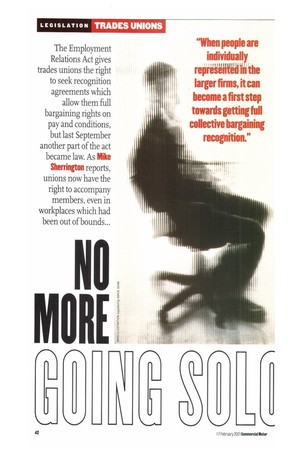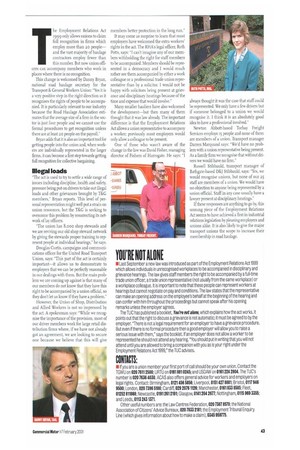"When people are individually
Page 144

Page 145

If you've noticed an error in this article please click here to report it so we can fix it.
repriii Va the
larger firms, it can become a first step towards getting full collective bargaining recognition."
The Employment Relations Act 1999 only allows unions to claim full recognition in firms which employ more than 20 people— and the vast majority of haulage contractors employ fewer than this number. But now union officers can accompany members who work in places where there is no recognition.
This change is welcomed by Danny Bryan, national road haulage secretary for the Transport & General Workers Union: "Yes it is a very positive step in the right direction as it recognises the rights of people to be accompanied. It is particularly relevant to our industry because the Road Haulage Association estimates that the average size of a firm in the sector is just four people and we cannot use the formal procedures to get recognition unless there are at least zo people on the payroll."
Bryan adds that it is also an important tool for getting people into the union and, when workers are individually represented in the larger firms, it can become a first step towards getting full recognition for collective bargaining.
Illegal loads
"The act is used to try to settle a wide range of issues including discipline, health and safety, pressure being put on drivers to take out illegal loads and other grievances brought by MC members," Bryan reports. This level of personal representation might well put a strain on union resources, but the T&G is seeking to overcome this problem by resurrecting its network of lay officers.
"The union has 8,000 shop stewards and we are reviving our old shop steward network by giving the stewards proper training to represent people at individual hearings," he says.
Douglas Curtis, campaigns and communications officer for the United Road Transport Union, says; "This part of the act is certainly important—it allows us to demonstrate to employers that we can be perfectly reasonable in our dealings with them. But the main probkm we are coming up against is that many of our members do not know that they have this right to be accompanied by a union official, so they don't let us know if they have a problem."
However, the Union of Shop, Distribution and Allied Workers is not so impressed by the act. A spokesman says: 'While we recognise the importance of the provision, most of our driver members work for large retail distribution firms where, if we have not already got an agreement, we are looking to secure one because we believe that this will give members better protection in the long run."
It may come as surprise to learn that most employers have welcomed the extra workers' rights in the act. The RHA's legal officer, Ruth Potts, says: "I can't imagine any of our members withholding the right for staff members to be accompanied, Members should be represented in a democracy and I would much rather see them accompanied by either a work colleague or a professional trade union representative than by a solicitor. I would not be happy with solicitors being present at grievance and disciplinary hearings because of the time and expense that would involve."
Many smaller hauliers have also welcomed the development—but then many of them thought that it was law already. The important difference is that the Employment Relations Act allows a union representative to accompany a worker; previously most employers would only allow a colleague to be present One of those who wasn't aware of the change in the law was David Fisher, managing director of Fishers of Harrogate. He says: "I always thought it was the case that staff could be represented. We only have a few drivers but if someone belonged to a union we would recognise it. I think it is an absolutely good idea to have a professional involved."
Newton Abbott-based Torbay Freight Services employs 15 people and none of them are members of a union. Transport manager Darren Marquand says: "We'd have no problem with a union representative being present As a family firm we recognise that without drivers we would have no firm."
Russell Stibbauld, transport manager of Bathgate-based D&J Stibbauld, says: 'Yes, we would recognise unions, but none of our 25 staff are members of a union. We would have no objection to anyone being represented by a union official. Staff in any case usually have a lawyer present at disciplinary hearings."
If these responses are anything to go by, this unsung piece of the Employment Relations Act seems to have achieved a first in industrial relations legislation by pleasing employers and unions alike. It is also likely to give the major transport unions the scope to increase their membership in road haulage.




































































































































































































